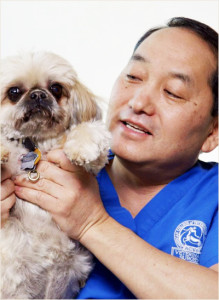National Animal Poison Prevention Week – March 20-26th

This year, National Poison Prevention Week is March 20-26th. While poison might not be the first thing you think of when you consider pet safety in the home, keeping dangerous ingestibles away from your pets is an important consideration for all pet owners. Just like toddlers, pets are prone to putting things in their mouths that they shouldn’t, so why not take a bit of time and poison-proof your home this March?
Chemicals and cleaning agents are responsible for a large proportion of pet poisonings annually. Keep all chemicals out of reach of your pet, or if you can’t do that, put toddler-proof locks on your cabinets. Cats love to open cabinet doors, and dogs love to sniff and taste. Even if you can’t imagine why on earth your cat or dog would get into the Lysol, gasoline, or windshield wiper fluid, they just might if you let them. Many household cleaning products are toxic and can cause vomiting or even chemical burns of the mouth, tongue, esophagus, and stomach, and less than a tablespoon of antifreeze can kill a 20-pound dog. So, make sure to be as careful as possible with these common household fluids!
Plants are another common source of pet poisonings. Be very aware of what plants you keep in your home and even your yard! Many people keep philodendrons, poinsettias, and Easter lilies in their homes, but these are all toxic to dogs and cats. As far as yard plants go, oleanders, azaleas, sago palms, yews, and caster beans are toxic to animals. If you’re concerned, you can look at the ASPCA’s guide here.
While you’re looking around your home, keep an eye out for other items that might be toxic to your cat or dog. Mothballs, fabric softener sheets, cigarettes, batteries, potpourri, and coffee grounds are all bad for your pets, and of course medications fall into that category. It’s a good idea to keep your prescription drugs in a secure place as a rule of thumb, but if you have an inquisitive cat or dog, be doubly sure they’re out of reach. And it’s not just prescription drugs that can be deadly—cold medicine, vitamins, and diet pills can kill as effectively as painkillers.
All of the above items are fairly obvious sources of poisoning. But foods that are perfectly safe for humans can be just as toxic as cleaners and chemicals. Onions and garlic should never be fed to dogs and cats, nor should chocolate, alcohol, raisins or grapes, or uncooked yeast dough.
Finally, be sure to keep any rodent or insect bait away from your pets, and wipe your pets’ paws after they walk on chemically treated lawns or ice melt. Dogs and cats may lick their paws to clean them if you don’t!
Accidents happen, so if your pet ingests something toxic, call the ASPCA Poison Control Center or VRC, your local veterinary specialty hospital in the Philadelphia area.
VRC Specialty Hospital in Malvern is open 24 hours a day, 7 days a week, 356 days a year. We are an emergency clinic for your pet in the Philadelphia area. Give VRC a call at (610) 647-2950 if you suspect your pet has been poisoned.






 Email
Email
